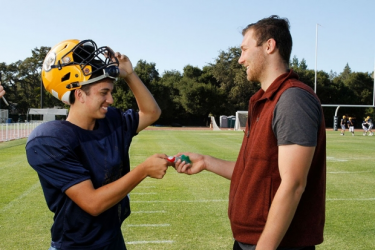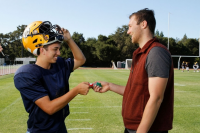Doctors, brain scientists and coaches alike used to think a concussion was no big deal – you get knocked out for a second, then you get it back together and keep on going with a game, a battle or just the rest of your day.
Not anymore. It’s now thought that even mild traumatic injuries can have potentially serious, lasting effects on the brain. Concern about those effects has led to changes in youth sports policies and campaigns aimed at raising awareness about the risks and symptoms associated with concussions and other brain injuries.
At the same time, teams of Stanford researchers in the Schools of Medicine, Engineering and Education and Stanford’s interdisciplinary life sciences institutes are working together to better understand what causes concussions, how to diagnose and treat them and, perhaps most important, how to prevent them from happening in the first place.















































